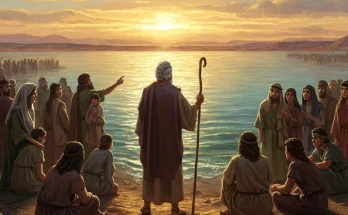Have you ever wondered why God accepted Abel’s offering but rejected Cain’s? This question takes us back to Genesis 4, where we meet two brothers with two very different hearts. Abel, a shepherd, brought God the best of his flock, while Cain, a farmer, offered some of his crops. At first glance, both sacrifices seem acceptable, yet God favored Abel’s.
So, what made Abel’s offering different? The answer lies in faith. Abel gave with a sincere heart, trusting fully in God. His sacrifice wasn’t just an act of duty—it was an act of worship. In contrast, Cain’s offering lacked faith and devotion. Because of this, God rejected it, sparking jealousy in Cain’s heart. Sadly, this jealousy led to the first recorded murder in Scripture.
📖 Make your Come Follow Me study easier—grab your copy of Old Testament Made Easier today! 🙌✨
Although Abel’s life was brief, his faith still speaks. His story reminds us that God sees the heart behind our worship. What we give to Him—whether our time, resources, or devotion—should be offered with faith. Abel’s legacy challenges us to examine our own hearts. Are we worshiping God in faith, or simply going through the motions?
Strengths and Accomplishments
Abel stood out as a man of faith, fully trusting in God. Unlike his brother, he didn’t just bring an offering—he gave his best. Hebrews 11:4 tells us that Abel’s faith made his sacrifice acceptable. He didn’t rely on empty rituals; instead, he worshiped with sincerity.
Because of his faith, Abel became the first recorded example of true worship. He understood that honoring God required more than just giving—it required a heart devoted to Him. While Cain’s offering was rejected, Abel’s pleased God, setting a powerful standard for all believers.
Though his life was short, Abel’s faith still speaks. His name appears in the “Hall of Faith” in Hebrews 11, proving his righteousness. Even after death, his testimony continues to inspire us. Faithful worship leaves a lasting impact, just as Abel’s life demonstrates.
His story reminds us that faith matters more than outward actions. We can’t just go through the motions—we must worship with our whole hearts. Abel’s unwavering trust in God challenges us to ask: Are we giving God our best, or are we holding back?
Weaknesses and Mistakes of Abel
Unlike many biblical figures, Abel has no recorded personal failures or sins. Scripture presents him as a man of faith and righteousness. However, his story still reveals important truths about the challenges of living faithfully before God.
Because Abel was righteous, he became a target for his brother’s jealousy. Cain’s anger grew when God accepted Abel’s offering but rejected his own. Instead of repenting, Cain let resentment take control, ultimately leading to Abel’s murder. This reminds us that living righteously doesn’t always mean we’ll be safe from harm.
🔍 Simplify your Old Testament study with this easy-to-follow journal edition! 📚📝
Abel’s short life also teaches us that faithfulness doesn’t guarantee an easy path. Though he pleased God, he still suffered injustice. His story echoes the reality that many faithful believers throughout history have faced persecution. Yet, despite his untimely death, Abel’s faith continues to inspire.
Sometimes, we assume that following God will shield us from pain. However, Abel’s life shows that righteousness may bring opposition. Even when others reject us for our faith, God sees and honors those who remain faithful. Like Abel, we must trust that our devotion to God is never in vain.
Lessons from Their Life
Abel’s life may have been short, but the lessons it teaches are timeless. His faith, worship, and tragic death remind us of deep spiritual truths. Let’s explore what we can learn from his example.
Faith Is Essential to Please God
Abel’s sacrifice was accepted because it was given in faith (Hebrews 11:6). He didn’t just go through the motions—he trusted God completely. His story reminds us that faith is the foundation of true worship. Without it, our actions mean little to God.
True Worship Requires a Sincere Heart
God didn’t favor Abel’s offering just because it was a better product. He accepted it because it came from a devoted heart. External actions alone aren’t enough—God desires sincerity in our worship. Like Abel, we must worship Him with faith, love, and obedience.
Righteousness May Lead to Persecution
Cain’s anger toward Abel reveals a difficult truth—righteousness can stir resentment. Those who live by faith may face opposition from those who reject God. Abel’s story reminds us to remain faithful, even when we face hardship or rejection.
God Sees and Remembers the Faithful
Although Abel died young, his faith was not forgotten. Hebrews 12:24 tells us his blood still speaks, bearing witness to his righteousness. Likewise, God sees our faithfulness and will honor those who trust Him.
Abel’s life teaches us to worship God sincerely, trust Him fully, and remain faithful even when it’s hard. His story challenges us to ask: Are we living by faith or just following religious routines?
Vital Statistics of Abel
Abel’s name means “breath” or “vapor,” which reminds us how brief life can be. Though his time on earth was short, his faith left a lasting impact.
He was the son of Adam and Eve and the younger brother of Cain. As one of the first children born after creation, Abel had no written laws or scriptures. Yet, he still understood what pleased God—offering a sacrifice in faith.
Abel worked as a shepherd, caring for his flock with diligence. His role stands in contrast to Cain, who tilled the ground as a farmer. While both occupations were valuable, Abel’s sacrifice reflected true devotion.
He lived east of Eden, where his family settled after Adam and Eve were expelled from the garden. This was a world affected by sin, yet Abel still chose righteousness.
The most notable event in Abel’s life was also his greatest tragedy—he was murdered by Cain out of jealousy (Genesis 4:8). His death was the first recorded act of violence in human history. However, his faith was not in vain. Hebrews 11:4 reminds us that Abel’s testimony still speaks, calling us to live by faith.
- Name Meaning: “Breath” or “Vapor“
- Family: Son of Adam and Eve, younger brother of Cain
- Occupation: Shepherd
- Location: East of Eden
- Notable Event: Murdered by Cain due to jealousy (Genesis 4:8)
Final Thoughts on Abel
Abel lived a short but significant life, leaving behind a powerful example of faith. Though his time on earth was brief, his devotion to God set him apart. He didn’t just offer a sacrifice—he gave his best with a sincere heart.
His story reminds us that God values faith over empty rituals. Worship is not about routine; it’s about trusting and honoring God with all we have. Abel’s faith pleased God, proving that genuine devotion matters more than the act itself.
Yet, despite his righteousness, Abel still suffered injustice. His brother’s jealousy led to his tragic death, showing that faithfulness doesn’t always protect us from hardship. However, God never forgets the faithful. Hebrews 11:4 tells us that Abel’s faith still speaks, encouraging us to walk in obedience.
Like Abel, we must ask ourselves: Are we worshiping God with sincerity, or just going through the motions? True faith leaves a lasting impact. When we trust God fully, our lives—no matter how long or short—can glorify Him. Abel’s story challenges us to live with faith, knowing that God sees and honors those who are faithful to Him.
Key Verse for Abel
By faith Abel brought God a better offering than Cain did. By faith he was commended as righteous, when God spoke well of his offerings. And by faith Abel still speaks, even though he is dead. (Hebrews 11:4 NIV)
Abel’s story is told in Genesis 4:1-8. He is also mentioned in Matthew 23:35, Luke 11:51; Hebrews 11:4 and 12:24.
🙏 Deepen your understanding of the Old Testament—get the Made Easier journal now! ✨📖
Frequently Asked Questions (FAQs) about Abel
1. Why did God accept Abel’s offering but reject Cain’s? God accepted Abel’s offering because it was given in faith (Hebrews 11:4). Abel brought the best of his flock with a sincere heart, while Cain’s offering lacked true devotion. God looks at the heart behind our worship, not just the outward action.
2. What does Abel’s life teach us about faith? Abel’s life teaches us that faith is essential to please God. He trusted God completely and gave his best in worship. Though his life was short, his faith continues to speak, reminding us that God values sincerity over routine religious acts.
3. How does Abel’s story apply to us today? Abel’s story challenges us to examine our own faith and worship. Are we giving God our best, or just going through the motions? His life also reminds us that living righteously may lead to opposition, but God always remembers and honors the faithful.



